It looks like you're using an Ad Blocker.
Please white-list or disable AboveTopSecret.com in your ad-blocking tool.
Thank you.
Some features of ATS will be disabled while you continue to use an ad-blocker.
share:
a reply to: Kantzveldt
Back to your opening. (I pretty much have to look up everything you mention (( because on the ignorance/omniscience scale, I show very little advancement)) ).
My current working hypothesis: The texts of Christianity were written in the midst of conflict.
(not in chronological order)
1) Josephus was a rebel attacking Sepphoris on behalf of Jewish rebellion against Rome before he changed sides and tried ( unsuccessfully ) to be a peacemaker.
2) Paul was attacking "Jesus is Messiah" people before he switched sides to "Jesus is Christ", and attempted to share an inclusive "There is neither Jew nor Greek, there is neither slave nor free man, there is neither male nor female; for you are all one in Christ Jesus." while retaining a possible fatal flaw, "if you belong to Christ, then you are Abraham's descendants," Galatians 3:28.
3) When the Jewish rebellion was in its early stages, along with many other advocates of restraint, Paul also planned to go to Rome to appeal to Caesar for restraint. He compromised his position in his letter to Romans by introducing "Jew first, and also Gentiles" language, and made appeal to post-exile Jewish writings.
4) The gospels were written around the rebellion times ( just prior to, during, and after the fall of Jerusalem ).
These are examples of early Christianity as compromise for the sake of peaceful relations ( in varying degrees ) between Roman Civilization and early Judaic thought.
5) More than 1 or 2 biblical scholars identify the book of Revelation to be war propaganda written from a Parthian(Mesopotamian) point of view, directed at Roman Christians, designed to cause civil unrest within the Roman world, during the seemingly unending conflict between Roman and Parthian Empires.
And then, I looked up Mandaeans, because you quoted from a source later in the thread.
Hardly anything (relatively speaking) is known of the Mandaean views. Thanks to U.S. invasion whole branches of thought are lost forever.
Speaking as a post Christian, I firmly believe that some compromises should not be made. Specifically, with the deity described in the Old Testament. Christianity as we know it will never realize that introducing an exclusive singular into a plural system destroys plurality.
It's sad that the proper historical context of Christianity has been so suppressed and ignored, that what represents Christianity today is at best likely a distorted half truth, the religion that developed in Galilee as a fusion of Greek religion and Hebrew tradition, a product of Sepphoris in the vicinity of Nazareth.
Back to your opening. (I pretty much have to look up everything you mention (( because on the ignorance/omniscience scale, I show very little advancement)) ).
My current working hypothesis: The texts of Christianity were written in the midst of conflict.
(not in chronological order)
1) Josephus was a rebel attacking Sepphoris on behalf of Jewish rebellion against Rome before he changed sides and tried ( unsuccessfully ) to be a peacemaker.
2) Paul was attacking "Jesus is Messiah" people before he switched sides to "Jesus is Christ", and attempted to share an inclusive "There is neither Jew nor Greek, there is neither slave nor free man, there is neither male nor female; for you are all one in Christ Jesus." while retaining a possible fatal flaw, "if you belong to Christ, then you are Abraham's descendants," Galatians 3:28.
3) When the Jewish rebellion was in its early stages, along with many other advocates of restraint, Paul also planned to go to Rome to appeal to Caesar for restraint. He compromised his position in his letter to Romans by introducing "Jew first, and also Gentiles" language, and made appeal to post-exile Jewish writings.
4) The gospels were written around the rebellion times ( just prior to, during, and after the fall of Jerusalem ).
These are examples of early Christianity as compromise for the sake of peaceful relations ( in varying degrees ) between Roman Civilization and early Judaic thought.
5) More than 1 or 2 biblical scholars identify the book of Revelation to be war propaganda written from a Parthian(Mesopotamian) point of view, directed at Roman Christians, designed to cause civil unrest within the Roman world, during the seemingly unending conflict between Roman and Parthian Empires.
And then, I looked up Mandaeans, because you quoted from a source later in the thread.
en.wikipedia.org...
There are thought to be between 60,000 and 70,000 Mandaeans worldwide.[5] Until the 2003 Iraq war, almost all of them lived in Iraq.[6] Many Mandaean Iraqis have since fled their country (as have many other Iraqis) because of the turmoil created by the 2003 invasion of Iraq and subsequent occupation by U.S. armed forces, and the related rise in sectarian violence by Muslim extremists.[7] By 2007, the population of Mandaeans in Iraq had fallen to approximately 5,000
Hardly anything (relatively speaking) is known of the Mandaean views. Thanks to U.S. invasion whole branches of thought are lost forever.
Speaking as a post Christian, I firmly believe that some compromises should not be made. Specifically, with the deity described in the Old Testament. Christianity as we know it will never realize that introducing an exclusive singular into a plural system destroys plurality.
the Mandaeans believe that Abraham and Moses were false prophets,
. . .
Mandaeans consider the holy spirit that is known as Ruha d-Qudsha in the Talmud and Bible to be an evil being.
a reply to: Kantzveldt
So, according to Sumerian mythology, Enki created men to work the mines and women to work the plants?
👣
So, according to Sumerian mythology, Enki created men to work the mines and women to work the plants?
👣
a reply to: pthena
Yes you pretty much reflect some of my own doubts there with regards to Saint Paul, that he recognized that repackaging the Gentiles own beliefs into a scenario that promoted the Hebrew scriptures and their status as a chosen people was going to be pretty much the best thing that had ever happened for them, it took the arrival of the Protestants and their being able to engross themselves in the Old Testament and the Freemasons buying into the supposed kabbalistic mysteries before things really came to fruition, but here we are.
Saint Paul went full tilt with the Apollo like Christos, not surprisingly early Christians represented him exactly as Apollo, or Hermes or Orpheus, related aspects of his cult, the spread of Christianity generally saw a rebranding of earlier cultic sites to associated aspects of the supposed new religion, of course the Jews were never going to buy into it.
I think the original venture was undertaken in good faith however and that it's valid, a sensible development of it's day.
The Mandaeans are complex but they were dead set against Nanaya;
They relegated her to Demon status and closed down her cultic sites, they do believe though in the ultimate redemption of Ruha qudosh, the Feminine Holy spirit.
Mysterious Mandaeans
a reply to: BlueMule
No not really there is no mention of mining, but the association of women with plant lore and cultivation was time honoured.
Yes you pretty much reflect some of my own doubts there with regards to Saint Paul, that he recognized that repackaging the Gentiles own beliefs into a scenario that promoted the Hebrew scriptures and their status as a chosen people was going to be pretty much the best thing that had ever happened for them, it took the arrival of the Protestants and their being able to engross themselves in the Old Testament and the Freemasons buying into the supposed kabbalistic mysteries before things really came to fruition, but here we are.
Saint Paul went full tilt with the Apollo like Christos, not surprisingly early Christians represented him exactly as Apollo, or Hermes or Orpheus, related aspects of his cult, the spread of Christianity generally saw a rebranding of earlier cultic sites to associated aspects of the supposed new religion, of course the Jews were never going to buy into it.
I think the original venture was undertaken in good faith however and that it's valid, a sensible development of it's day.
The Mandaeans are complex but they were dead set against Nanaya;
Bound is the phalanx of Nanay, she and her seven sisters who dwell on the river Harin Bound and shackled is Nanay of Borṣip and shackled is Nanay of Bīt Guzayye which is in Gahzay
The earliest Mandaic texts also know Nabû as the god of Borsippa . In one Mandaic incantation, a reference is made to Nanaya as a magical medium beside the “wise men of Babylon”. On a magic bowl, Nanaya is called “mistress of the world.”
They relegated her to Demon status and closed down her cultic sites, they do believe though in the ultimate redemption of Ruha qudosh, the Feminine Holy spirit.
Mysterious Mandaeans
a reply to: BlueMule
No not really there is no mention of mining, but the association of women with plant lore and cultivation was time honoured.
edit on
Kpm430112vAmerica/ChicagoThursday2330 by Kantzveldt because: (no reason given)
a reply to: Kantzveldt
Hi kantz.
Did you know anything about the jade cups found in Equador?
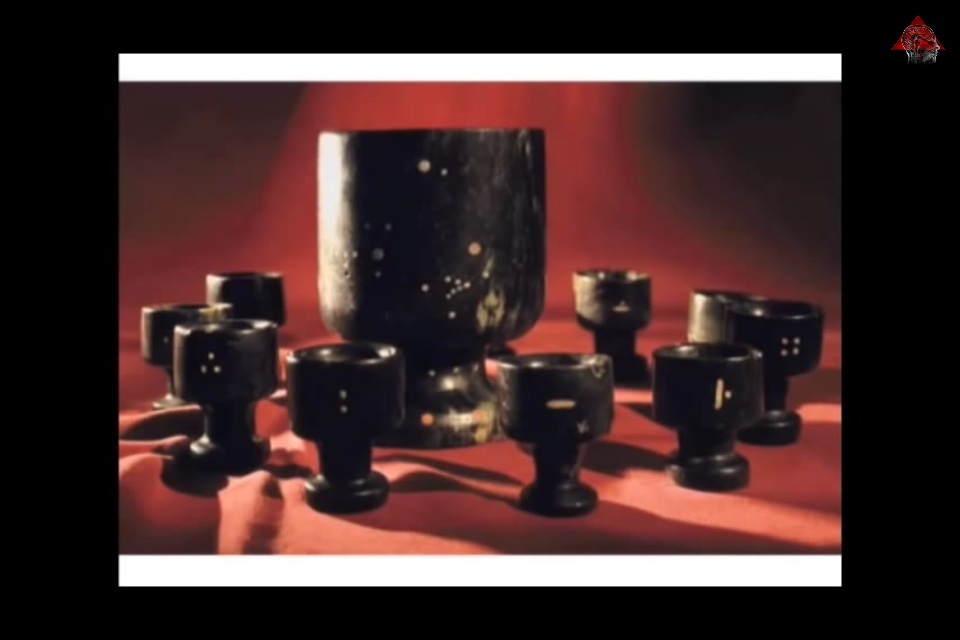
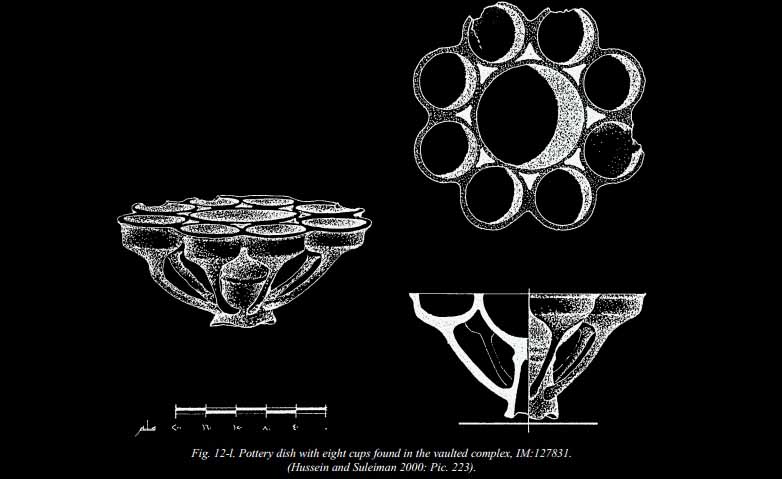
There is a short piece about them in this video from about the 16min mark. They are 12 in number and all slightly different in size but if all are filled with water, the total volume of water is exactly the same as what the large centre bowl/vessel is able to hold.
"Fill my cup, Lord;
I lift it up Lord;
Come and quench this thirsting of my soul.
Bread of Heaven, feed me till I want no more.
Fill my cup, fill it up and make me whole"
If there is a connection between the two, any ideas what the difference in the number of cups could mean or what the cups themselves could relate to? There are celestial engravings on the large cup depicting constellations.
Hi kantz.
Did you know anything about the jade cups found in Equador?


There is a short piece about them in this video from about the 16min mark. They are 12 in number and all slightly different in size but if all are filled with water, the total volume of water is exactly the same as what the large centre bowl/vessel is able to hold.
"Fill my cup, Lord;
I lift it up Lord;
Come and quench this thirsting of my soul.
Bread of Heaven, feed me till I want no more.
Fill my cup, fill it up and make me whole"
If there is a connection between the two, any ideas what the difference in the number of cups could mean or what the cups themselves could relate to? There are celestial engravings on the large cup depicting constellations.
edit on 24-4-2015 by Wifibrains because: (no reason given)
a reply to: Kantzveldt
Praise Athena!
It only took 12 hours of reading for me to fully understand ( albeit in a vulgar sense ) your original post.
My praise of Athena is not meant as an insult either to you or especially not to Nanaya. It is rather an admission and recognition of my own limited understanding and appreciation of cultural differences. I had originally planned on praising Nanaya, but it didn't feel right to me, it would have been presumptuous of me, and even insulting to Nanaya.
You wrote: "Athena as the personification of wisdom is a lame version of Nanaya;".
After careful consideration, I can accept that. However, let us also consider this:
I occasionally look in on ( mostly Wikipedia ) what developments are occurring within Christianity. I accidently came upon an interesting bit of info while looking up theism in general.
The point that I make by quoting this is for the concept that the divine is deeply moved by creation. In my point of view, that would include geography, topography, and also how a particular group of people feed themselves. Greeks did not live next to the ante-deluvian rivers. Their hunting and agriculture were not the same.
If the Goddess chose to reveal herself to one group of people slightly differently than as revealed to another group then who are we to object?
Why would She be a virgin to the Greeks? Why is Mary a virgin to some Christians?
Access! A consort of none is accessible to all. This is my belief. This is possibly why Athena and Mary are ever-virgin. Because that's what people needed of her. Is the Goddess not free? I think she is.
I still need to read the pdfs you gave links to. Perhaps someday I may be worthy to praise Nanaya.
ETA
It has been said that the idea of democracy came from the Greeks. If Wisdom's only consort was a king, then wouldn't the people be less wise, maybe not wise enough to have opinions of their own?
ETA
1 Corinthians 7 NET Bible
36 If anyone thinks he is acting inappropriately toward his virgin, if she is past the bloom of youth and it seems necessary, he should do what he wishes; he does not sin. Let them marry. 37 But the man who is firm in his commitment, and is under no necessity but has control over his will, and has decided in his own mind to keep his own virgin, does well. 38 So then, the one who marries his own virgin does well, but the one who does not, does better.
Praise Athena!
It only took 12 hours of reading for me to fully understand ( albeit in a vulgar sense ) your original post.
My praise of Athena is not meant as an insult either to you or especially not to Nanaya. It is rather an admission and recognition of my own limited understanding and appreciation of cultural differences. I had originally planned on praising Nanaya, but it didn't feel right to me, it would have been presumptuous of me, and even insulting to Nanaya.
You wrote: "Athena as the personification of wisdom is a lame version of Nanaya;".
After careful consideration, I can accept that. However, let us also consider this:
I think the original venture was undertaken in good faith however and that it's valid, a sensible development of it's day.
I occasionally look in on ( mostly Wikipedia ) what developments are occurring within Christianity. I accidently came upon an interesting bit of info while looking up theism in general.
Open theism as a theological movement developed within evangelical and post-evangelical Protestant Christianity as a response to certain ideas related to the synthesis of Greek philosophy and Christian theology. It is typically advanced as a biblically motivated and philosophically consistent theology of human and divine freedom (in the libertarian sense), with an emphasis on what this means for the content of God's foreknowledge and exercise of God's power.[2][3] In short, open theism says that since God and humans are free, God's knowledge is dynamic and God's providence flexible.
. . .
They also (in contrast to traditional theism) tend to hold that the biblical portrait of God is of one deeply moved by creation, experiencing a variety of feelings in response to it.[7]
The point that I make by quoting this is for the concept that the divine is deeply moved by creation. In my point of view, that would include geography, topography, and also how a particular group of people feed themselves. Greeks did not live next to the ante-deluvian rivers. Their hunting and agriculture were not the same.
If the Goddess chose to reveal herself to one group of people slightly differently than as revealed to another group then who are we to object?
Why would She be a virgin to the Greeks? Why is Mary a virgin to some Christians?
Access! A consort of none is accessible to all. This is my belief. This is possibly why Athena and Mary are ever-virgin. Because that's what people needed of her. Is the Goddess not free? I think she is.
I still need to read the pdfs you gave links to. Perhaps someday I may be worthy to praise Nanaya.
ETA
It has been said that the idea of democracy came from the Greeks. If Wisdom's only consort was a king, then wouldn't the people be less wise, maybe not wise enough to have opinions of their own?
ETA
1 Corinthians 7 NET Bible
36 If anyone thinks he is acting inappropriately toward his virgin, if she is past the bloom of youth and it seems necessary, he should do what he wishes; he does not sin. Let them marry. 37 But the man who is firm in his commitment, and is under no necessity but has control over his will, and has decided in his own mind to keep his own virgin, does well. 38 So then, the one who marries his own virgin does well, but the one who does not, does better.
edit on 24-4-2015 by pthena because: (no reason given)
a reply to: pthena
I didn't really mean anything by it except whereas Athena pops out fully formed the role of Nanaya as sexual Goddess and Bau as domestic can be traced right back to the traditional role of women in gathering and preparation in hunter gatherer cultures, there is indication of how the wisdom is obtained, so in that sense more depth to the tradition, in their role as Queen both were expected to be good listeners and approachable and to give good counsel, which is a fairly direct equivalent of Athena.
Nanaya could also be surprisingly warlike as that also had become an aspect of Inanna/Istar and could thus be referred to as a Goddess of Victory (Irnina).
Capable, wise, experienced,
raging Irnina, the most powerful among the Igigi,
you are the most exalted one, directing them.
She is a shining light, all people look at her.
Let her flare up in the temple and shine .
Nanaya is very fierce in her attack
The biblical tradition of the virgin Goddess i understand simply derives from the earlier usage of the term to relate to a young unmarried woman, it's generally considered there was nothing miraculous implied by such going on to conceive, Artemis is interesting in that if she develops as a potential stand alone representation of the Feminine in the abstract metaphysical sense there can be no natural Male consort apart from her brother Apollo who is the balance in that sibling relationship, he also being without consort albeit many dalliances, the pair of them seemingly best left to themselves.
I'm not sure i quite follow what you're saying about the people being less wise and how that relates to Democracy, but in principle if the Goddess of wisdom watches over the entire city then perhaps that endows them with enough wisdom each to make their own decision in the running of the state...?
a reply to: Wifibrains
I have my doubts about those, i think they're part of Klaus Dona's collection of notorious fake artifacts.
I didn't really mean anything by it except whereas Athena pops out fully formed the role of Nanaya as sexual Goddess and Bau as domestic can be traced right back to the traditional role of women in gathering and preparation in hunter gatherer cultures, there is indication of how the wisdom is obtained, so in that sense more depth to the tradition, in their role as Queen both were expected to be good listeners and approachable and to give good counsel, which is a fairly direct equivalent of Athena.
Nanaya could also be surprisingly warlike as that also had become an aspect of Inanna/Istar and could thus be referred to as a Goddess of Victory (Irnina).
Capable, wise, experienced,
raging Irnina, the most powerful among the Igigi,
you are the most exalted one, directing them.
She is a shining light, all people look at her.
Let her flare up in the temple and shine .
Nanaya is very fierce in her attack
The biblical tradition of the virgin Goddess i understand simply derives from the earlier usage of the term to relate to a young unmarried woman, it's generally considered there was nothing miraculous implied by such going on to conceive, Artemis is interesting in that if she develops as a potential stand alone representation of the Feminine in the abstract metaphysical sense there can be no natural Male consort apart from her brother Apollo who is the balance in that sibling relationship, he also being without consort albeit many dalliances, the pair of them seemingly best left to themselves.
I'm not sure i quite follow what you're saying about the people being less wise and how that relates to Democracy, but in principle if the Goddess of wisdom watches over the entire city then perhaps that endows them with enough wisdom each to make their own decision in the running of the state...?
a reply to: Wifibrains
I have my doubts about those, i think they're part of Klaus Dona's collection of notorious fake artifacts.
edit on Kpm430113vAmerica/ChicagoFriday2430 by Kantzveldt because: (no reason given)
a reply to: Kantzveldt
This doesn't look good for my argument, with only Freud as backup, and that, after a demotion. Which leaves me with bare rhetoric.
I was actually referring to the Roman Catholic view of Mother, not the New Testament. I think it's clear that the definitive aspect stressed in the New Testament is the insistence that Jesus as Messiah(or Christ) was a son of David, why that would matter to Hellenists is unclear to me, no direct connection to Tammuz the shepherd is made. Therefore, purely for a Jewish audience.
Here comes the rhetoric.
In my attempt to find evidence for my position, I found evidence that supports the thesis of your original post. see Sifnos, an Ionian (same people as Athens) island with two main cities, one dedicated to Apollo and one dedicated to Artemis.
It may be a matter of opinion, and perhaps personal preference as to whether a Monistic or Dualistic view of reality is more sound.
It may be a matter of opinion or personal preference as to whether a base Dualism ie. Earth/Sky, Mother/Father, Night/Day, Hot/Cold, Female/Male, etc. is superior to or more natural for people. The alternative would be a full pantheon with many goddesses and gods, each more skilled than the others at certain crafts.
History of Hellenistic thought, as you have shown, inclined toward a bare Dualism, with Artemis and Apollo providing all things. Five years ago, or so, I viewed bare Dualism as somehow superior, as in Gaia/Cronus.
I've watched a couple of documentaries about what the world was like millions of years ago. There was no place for humans to survive, much less develop agriculture and civilization. Age of Chaos, as far as humanity goes. It was necessary that certain gas levels had to change proportions, notably, but not exclusively vast amounts of CO2, came out of the air to be trapped underground as carbon, ( Cronus consigned to Tartarus ).
I concede now that polytheism is more civilized and civilizing than a bare dualism. Therefore the goddesses do not need to be one goddess, nor the gods to be one god.
Athena is not Gaia, neither should she be. Athena is not Aphrodite, neither should she be. Not all women are married to men, nor should they be.
In the grain/beer rich plains of the two rivers, where the king was married to Nanaya, this may have been so in the city-states. A benevolent king could dispense the various bounties to the people who spent most their lives in what amounted to serfdom. Most of the waking day for many, the farmers and irrigators, was taken up with doing that which was necessary to keep the crops growing; not much leisure time.
The temples were in charge of the storing of foodstuffs ( but you know these things better than I do )
[ I find myself weary. Break time ]
Athena pops out fully formed the role of Nanaya as sexual Goddess and Bau as domestic can be traced right back to the traditional role of women in gathering and preparation in hunter gatherer cultures,
BirthAlthough Athena appears before Zeus at Knossos — in Linear B, as 𐀀𐀲𐀙𐀡𐀴𐀛𐀊, a-ta-na po-ti-ni-ja, “Mistress Athena”[47] — in the Classical Olympian pantheon, Athena was remade as the favorite daughter of Zeus, born fully armed from his forehead
. . .
A changed status in classical mythology
J.J. Bachofen advocated that Athena was originally a maternal figure stable in her security and poise but was caught up and perverted by a patriarchal society; this was especially the case in Athens. The goddess adapted but could very easily be seen as a god. He viewed it as "motherless paternity in the place of fatherless maternity" where once altered, Athena's character was to be crystallized as that of a patriarch.[69]
Whereas Bachofen saw the switch to paternity on Athena's behalf as an increase of power, Freud on the contrary perceived Athena as an "original mother goddess divested of her power". In this interpretation, Athena was demoted to be only Zeus's daughter, never allowed the expression of motherhood. Still more different from Bachofen's perspective is the lack of role permanency in Freud's view: Freud held that time and differing cultures would mold Athena to stand for what was necessary to them.[70]
This doesn't look good for my argument, with only Freud as backup, and that, after a demotion. Which leaves me with bare rhetoric.
The biblical tradition of the virgin Goddess i understand simply derives from the earlier usage
I was actually referring to the Roman Catholic view of Mother, not the New Testament. I think it's clear that the definitive aspect stressed in the New Testament is the insistence that Jesus as Messiah(or Christ) was a son of David, why that would matter to Hellenists is unclear to me, no direct connection to Tammuz the shepherd is made. Therefore, purely for a Jewish audience.
Artemis is interesting in that if she develops as a potential stand alone representation of the Feminine in the abstract metaphysical sense there can be no natural Male consort apart from her brother Apollo who is the balance in that sibling relationship, he also being without consort albeit many dalliances, the pair of them seemingly best left to themselves.
Here comes the rhetoric.
In my attempt to find evidence for my position, I found evidence that supports the thesis of your original post. see Sifnos, an Ionian (same people as Athens) island with two main cities, one dedicated to Apollo and one dedicated to Artemis.
It may be a matter of opinion, and perhaps personal preference as to whether a Monistic or Dualistic view of reality is more sound.
It may be a matter of opinion or personal preference as to whether a base Dualism ie. Earth/Sky, Mother/Father, Night/Day, Hot/Cold, Female/Male, etc. is superior to or more natural for people. The alternative would be a full pantheon with many goddesses and gods, each more skilled than the others at certain crafts.
History of Hellenistic thought, as you have shown, inclined toward a bare Dualism, with Artemis and Apollo providing all things. Five years ago, or so, I viewed bare Dualism as somehow superior, as in Gaia/Cronus.
I've watched a couple of documentaries about what the world was like millions of years ago. There was no place for humans to survive, much less develop agriculture and civilization. Age of Chaos, as far as humanity goes. It was necessary that certain gas levels had to change proportions, notably, but not exclusively vast amounts of CO2, came out of the air to be trapped underground as carbon, ( Cronus consigned to Tartarus ).
I concede now that polytheism is more civilized and civilizing than a bare dualism. Therefore the goddesses do not need to be one goddess, nor the gods to be one god.
Athena is not Gaia, neither should she be. Athena is not Aphrodite, neither should she be. Not all women are married to men, nor should they be.
in principle if the Goddess of wisdom watches over the entire city then perhaps that endows them with enough wisdom each to make their own decision in the running of the state...?
In the grain/beer rich plains of the two rivers, where the king was married to Nanaya, this may have been so in the city-states. A benevolent king could dispense the various bounties to the people who spent most their lives in what amounted to serfdom. Most of the waking day for many, the farmers and irrigators, was taken up with doing that which was necessary to keep the crops growing; not much leisure time.
The temples were in charge of the storing of foodstuffs ( but you know these things better than I do )
[ I find myself weary. Break time ]
a reply to: pthena
Yes they weren't the only one's to pluck abstract qualities from the greater tradition and set them up in the Heavens as absolute virtues, there was the Etruscan Minerva and i could not overlook our Brigit, of course Polytheism was at it's best when each person in society had a Deity that specifically related to their function within the greater scheme of things, their head God, if you simply place the various qualities in the heavens as shiny baubles people find it difficult to relate to the Divine.
There won't be any re-establishment of Polytheism and all the specialized religious cults required to form the parts of the greater whole, so stripped down Dualism it's going to be, but that will be more than capable of totally blowing peoples minds if and when properly taught, leading to perfect understanding of life.
Even though Apollo and Artemis went on to represent absolute Masculine and Feminine qualities, there was still that point of inter-section of the vertical and horizontal axis, and when translated to men and women they rarely come even close to personifying absolutes of either, there are men with pronounced Feminine qualities and visa versa, women that follow a Masculine trajectory are unlikely to want babies...
Yes they weren't the only one's to pluck abstract qualities from the greater tradition and set them up in the Heavens as absolute virtues, there was the Etruscan Minerva and i could not overlook our Brigit, of course Polytheism was at it's best when each person in society had a Deity that specifically related to their function within the greater scheme of things, their head God, if you simply place the various qualities in the heavens as shiny baubles people find it difficult to relate to the Divine.
There won't be any re-establishment of Polytheism and all the specialized religious cults required to form the parts of the greater whole, so stripped down Dualism it's going to be, but that will be more than capable of totally blowing peoples minds if and when properly taught, leading to perfect understanding of life.
Even though Apollo and Artemis went on to represent absolute Masculine and Feminine qualities, there was still that point of inter-section of the vertical and horizontal axis, and when translated to men and women they rarely come even close to personifying absolutes of either, there are men with pronounced Feminine qualities and visa versa, women that follow a Masculine trajectory are unlikely to want babies...
a reply to: Kantzveldt
That's awesome. You just perfectly said what i try to put in words for so so long.
You're right, abso-#ing-lutely right. We complicate thigs with time, specialise, come back through a loop were we try to get to the core and start simplifying, before we find one other truth that works and start making it compllicated again.
That's awesome. You just perfectly said what i try to put in words for so so long.
You're right, abso-#ing-lutely right. We complicate thigs with time, specialise, come back through a loop were we try to get to the core and start simplifying, before we find one other truth that works and start making it compllicated again.
a reply to: Peeple
We can go back even to the basic model of a Tree of Life of Enki and Ninhursaga, a singular upright trunk and the horizontal branches, the various functions of the Sumerian Gods covering governance of society were understood as the leaves of the Mes tree and had been distributed to them by Enki, Inanna wanted the leaves that said 'Kissing' or 'dancing' on them etc
So using that analogy a tree stripped down down to it's bare minimum is a little sad, better seen in full bloom and foliage, but you're right of course with regards to the neccessity of sometimes going back to basics, and perhaps we are in the depths of deepest darkest Winter.
We can go back even to the basic model of a Tree of Life of Enki and Ninhursaga, a singular upright trunk and the horizontal branches, the various functions of the Sumerian Gods covering governance of society were understood as the leaves of the Mes tree and had been distributed to them by Enki, Inanna wanted the leaves that said 'Kissing' or 'dancing' on them etc
So using that analogy a tree stripped down down to it's bare minimum is a little sad, better seen in full bloom and foliage, but you're right of course with regards to the neccessity of sometimes going back to basics, and perhaps we are in the depths of deepest darkest Winter.
edit on Kam430114vAmerica/ChicagoSaturday2530 by Kantzveldt because: (no reason given)
a reply to: Kantzveldt
I think we are, at a height of confusion and contradicting stories. So sad with these ISIS #s destroying all the undiscovered knowledge. And what a messed up history synchronicity they are called "Isis".
And they are mentioned in the Koran and all that. Well if you want to believe that is.
But since everything is a development, we should look forward to what we will maybe discover underneath, where we otherwise never would have dared to dig.
Someone should start to make a summation of all the shared traits with mentioning in more than one source and the supporting artifacts....
I think we are, at a height of confusion and contradicting stories. So sad with these ISIS #s destroying all the undiscovered knowledge. And what a messed up history synchronicity they are called "Isis".
And they are mentioned in the Koran and all that. Well if you want to believe that is.
But since everything is a development, we should look forward to what we will maybe discover underneath, where we otherwise never would have dared to dig.
Someone should start to make a summation of all the shared traits with mentioning in more than one source and the supporting artifacts....
a reply to: Kantzveldt
Ok, thanks. Explains why I could find little peer review. Just a image synchronicity that came up. The image of the bowls you posted... Was that artefact ever found or is that a artist rendition from a description?
Even if the klaus Dona cup set is a fake, the fact you say these bowl were worn as a hat is very interesting. This is why I asked if you knew of any information on what the right cup/bowls represented as the 12cups bowls seemed to represent to me a celestial crown. Energies from the constellations pouring into the centre...
Could it be there was a eight constellation system and/or planetary/solar system? The year cycle split into a eight segment or spoked wheel. Each bowl represented a celestial power that coincided with and the ancients attributed with specifics on earth, and the wearer of all eight as a crown or hat would be the representative of the goddess or creator of all.
Ok, thanks. Explains why I could find little peer review. Just a image synchronicity that came up. The image of the bowls you posted... Was that artefact ever found or is that a artist rendition from a description?
Even if the klaus Dona cup set is a fake, the fact you say these bowl were worn as a hat is very interesting. This is why I asked if you knew of any information on what the right cup/bowls represented as the 12cups bowls seemed to represent to me a celestial crown. Energies from the constellations pouring into the centre...
Could it be there was a eight constellation system and/or planetary/solar system? The year cycle split into a eight segment or spoked wheel. Each bowl represented a celestial power that coincided with and the ancients attributed with specifics on earth, and the wearer of all eight as a crown or hat would be the representative of the goddess or creator of all.
edit on 25-4-2015 by Wifibrains because: (no reason given)
a reply to: Wifibrains
The technical term for these is Kernos you'll see many examples there, there's no reason why they couldn't have gone on to represent 8 directions or 12 and planetary or constellation symbolism.
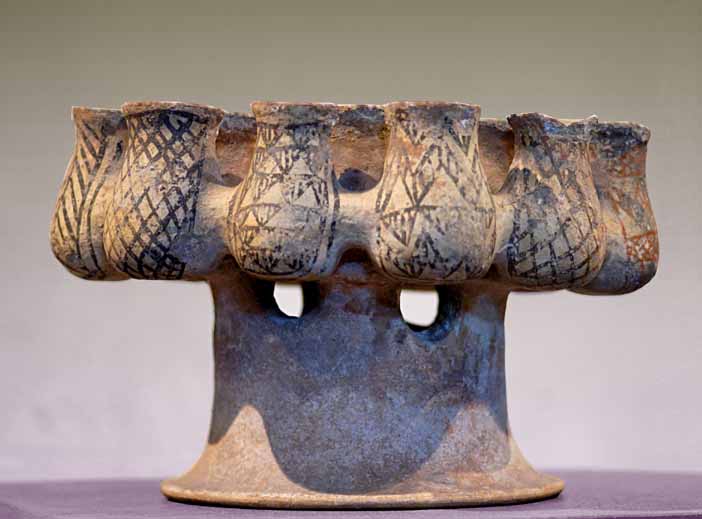
Common throughout the Eastern Meditteranean and used as noted in connection to the mysteries, there is always going to be the connection to plants and sexual mystery and rebirth cults, not normally as obvious as in the example below from Iran, but certainly the drawing example i used was found at Nimrod.
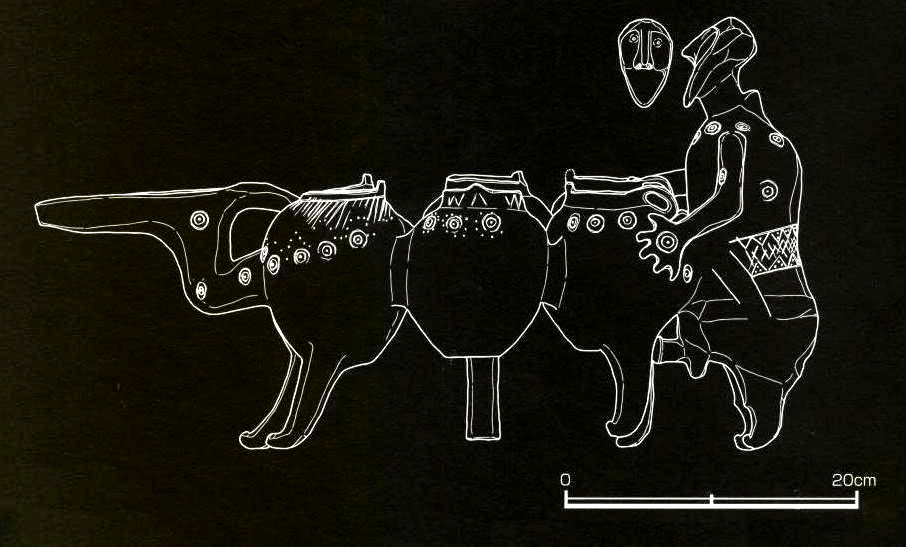
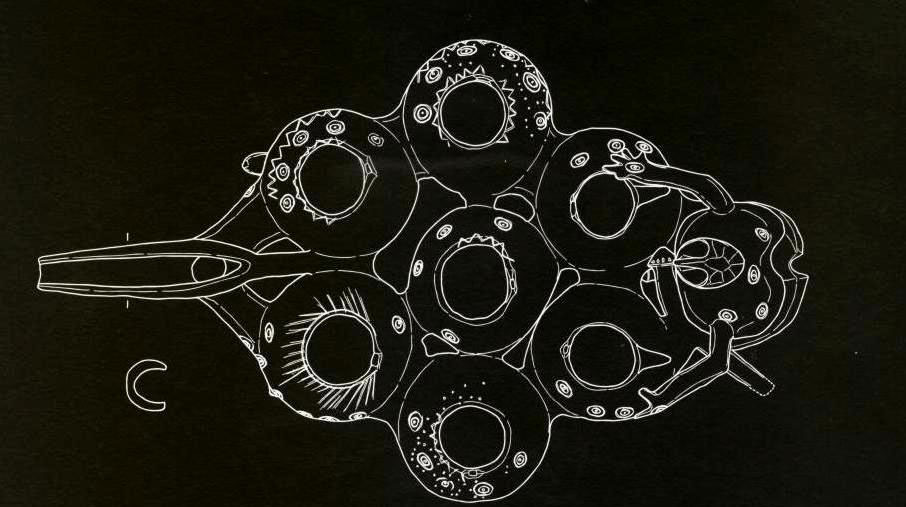
If you like a challenge you could also consider how this might relate to the transformation of people into frogs...
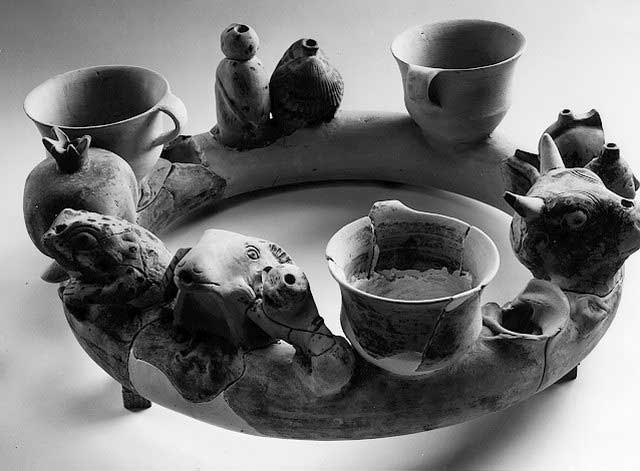
a reply to: Peeple
I'm sure the truth will out and all miscreants get their come uppance.
The technical term for these is Kernos you'll see many examples there, there's no reason why they couldn't have gone on to represent 8 directions or 12 and planetary or constellation symbolism.

Common throughout the Eastern Meditteranean and used as noted in connection to the mysteries, there is always going to be the connection to plants and sexual mystery and rebirth cults, not normally as obvious as in the example below from Iran, but certainly the drawing example i used was found at Nimrod.


If you like a challenge you could also consider how this might relate to the transformation of people into frogs...

a reply to: Peeple
I'm sure the truth will out and all miscreants get their come uppance.
edit on Kam430114vAmerica/ChicagoSaturday2530 by Kantzveldt because: (no
reason given)
edit on Kam430114vAmerica/ChicagoSaturday2530 by Kantzveldt because: (no reason given)
edit on
Kam430114vAmerica/ChicagoSaturday2530 by Kantzveldt because: (no reason given)
a reply to: Kantzveldt
Here are some more similes that could perhaps lead to understanding of meaning...
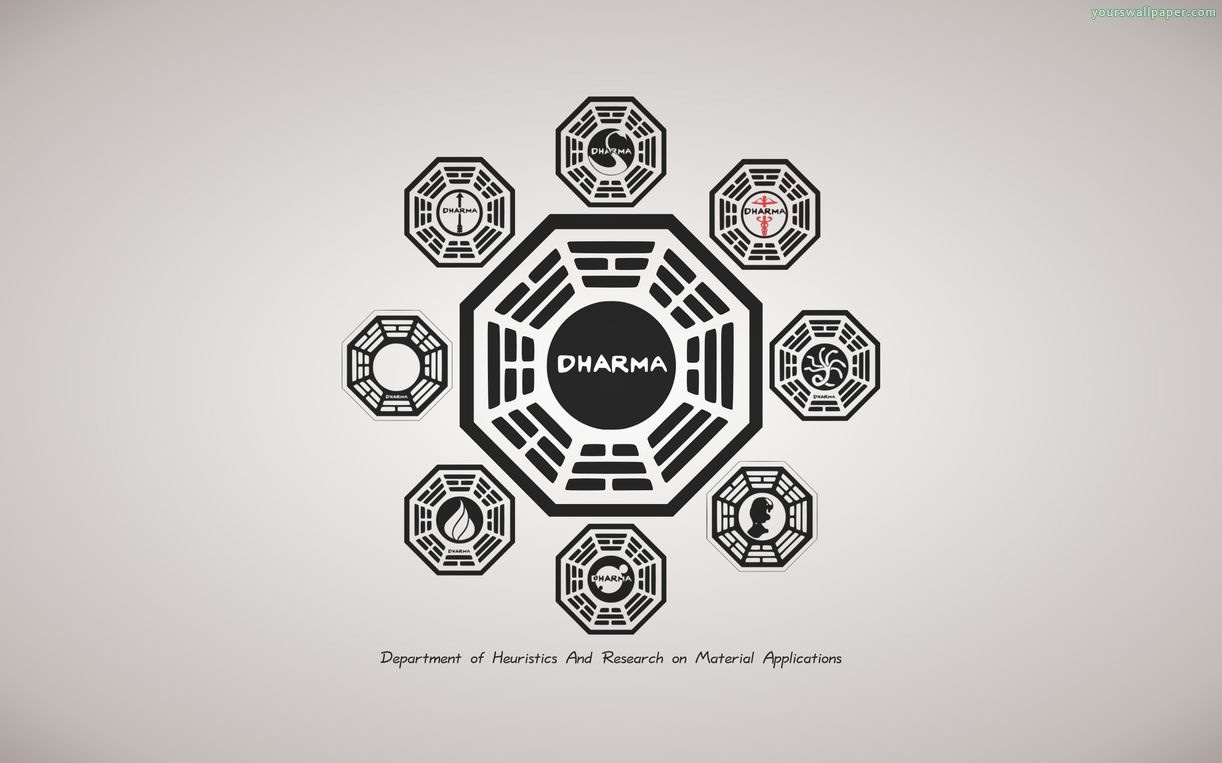
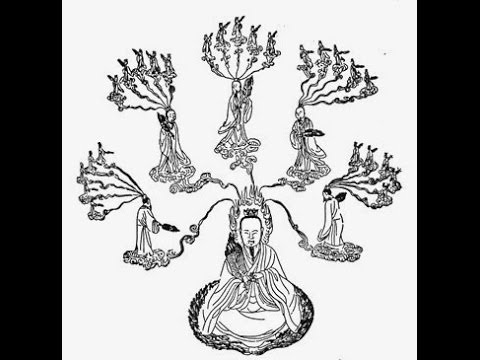
And vice versa?

In today's fairy tales it would involve a union (kiss) with a princess... However in yesteryear it could have symbolised a experience or state of being.
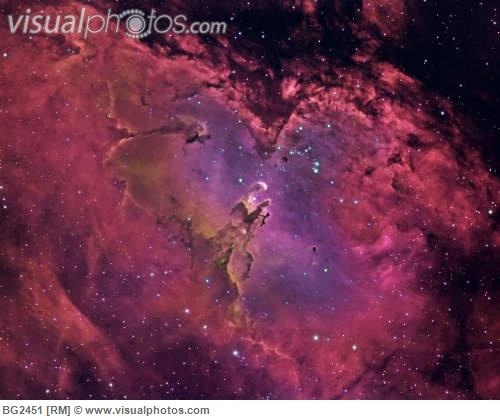
The first born over all creation? The pinnacle and goal of many a mystery school and rebirth cults.
The frogs having a fixed point on the wheel could symbolise entry/exit points if the wheel can be aligned celestially. The circular nature of the ornament suggest a cycle perhaps?

If the celestial realm was seen as watery and traversable via some sort of astral travel, a "space suit" depicting a frog makes sense as a means of displaying a way of travelling through this watery space.
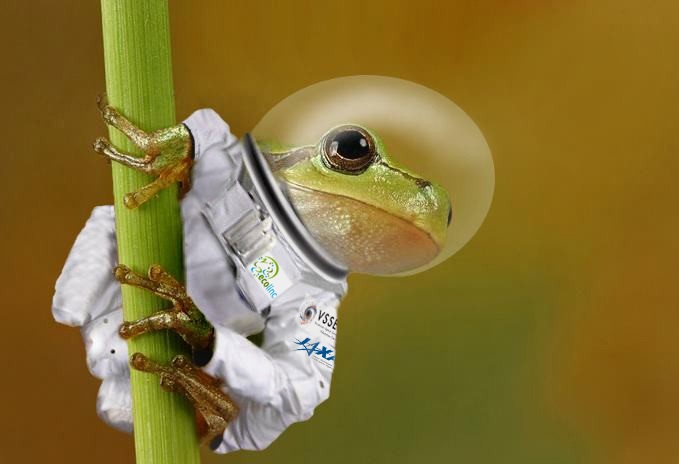
en.m.wikipedia.org...
Here are some more similes that could perhaps lead to understanding of meaning...


If you like a challenge you could also consider how this might relate to the transformation of people into frogs...
And vice versa?

In today's fairy tales it would involve a union (kiss) with a princess... However in yesteryear it could have symbolised a experience or state of being.

The first born over all creation? The pinnacle and goal of many a mystery school and rebirth cults.
The frogs having a fixed point on the wheel could symbolise entry/exit points if the wheel can be aligned celestially. The circular nature of the ornament suggest a cycle perhaps?

If the celestial realm was seen as watery and traversable via some sort of astral travel, a "space suit" depicting a frog makes sense as a means of displaying a way of travelling through this watery space.

The primeval waters were themselves part of the creation process, therefore, the deities representing them could be seen as creator gods. According to the myth, the eight gods were originally divided into male and female groups. They were symbolically depicted as aquatic creatures because they dwelt within the water: the males were represented as frogs, and the females were represented as snakes. These two groups eventually converged, resulting in a great upheaval, which produced the pyramidal mound. From it came the sun
en.m.wikipedia.org...
edit on 25-4-2015 by Wifibrains because: (no reason given)
a reply to: Wifibrains
You sort of got it, the symbol of an intermediate state of being, between water and land, between spiritual and physical, and obviously used in the mysteries to relate that kind of experience.
Inanna turned the gardener of Anu into a frog because he rejected her physical advances, hence a secret garden tradition, Gilgamesh also rejected the advances of Inanna and went off on his spiritual journey, such traditions were reflected in the resurrection narrative were Mary Magdalene 'mistakes' Jesus for the gardener, he is in the inter-mediate state so a case of noli mi tangere', a kiss of course returns the frog entirely to the natural physical.
Apart from the condition being induced in the mysteries it was also something of a natural consequence of rejecting carnal desires, thus celibacy was seen as conducive to achieving spiritual state.
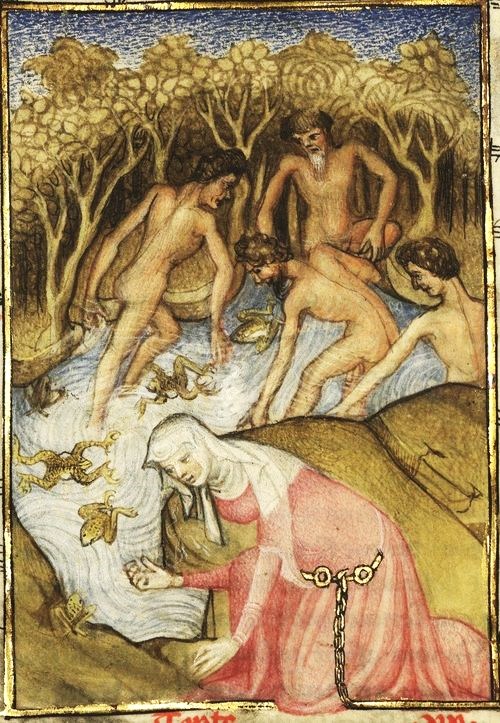
You sort of got it, the symbol of an intermediate state of being, between water and land, between spiritual and physical, and obviously used in the mysteries to relate that kind of experience.
Inanna turned the gardener of Anu into a frog because he rejected her physical advances, hence a secret garden tradition, Gilgamesh also rejected the advances of Inanna and went off on his spiritual journey, such traditions were reflected in the resurrection narrative were Mary Magdalene 'mistakes' Jesus for the gardener, he is in the inter-mediate state so a case of noli mi tangere', a kiss of course returns the frog entirely to the natural physical.
Apart from the condition being induced in the mysteries it was also something of a natural consequence of rejecting carnal desires, thus celibacy was seen as conducive to achieving spiritual state.

a reply to: Kantzveldt
I am currently in the process of creating a thread on this state, namely Atum as a macrocosmic intermediary or avatar for a expanded consciousness to fit into like a glove and interact with creation itself.
You sort of got it, the symbol of an intermediate state of being, between water and land, between spiritual and physical, and obviously used in the mysteries to relate that kind of experience.
I am currently in the process of creating a thread on this state, namely Atum as a macrocosmic intermediary or avatar for a expanded consciousness to fit into like a glove and interact with creation itself.
edit on 25-4-2015 by Wifibrains because: (no reason given)
a reply to: Kantzveldt
Thank you Kantzveldt.
After I went to sleep last night, I was fully prepared to:
... slowly ... quietly ... back out ...
slip through the side door ...
and
MAKE A RUN FOR IT!
Once safely away though, I calmed down and considered the wisdom of Neil Gaiman with regards to syncretism, as revealed in American Gods:
The old man in Iceland talking to Shadow, the protagonist of the story:
Neil Gaiman, American Gods (New York: Harpertorch, 2001) 586, 587.
This brings up another aspect of the problem:
The priests have a saying, "The essence is changed, but the accidents remain the same." Conversely, the syncretistic polytheists may say, "The essence remains the same, though the accidents change."
It is my belief that when speaking of what changes and what remains the same: The essence and accidents both change. Truth, Justice, and all the other various qualities don't start as statics that eventually move, nor do they progress from movement to a static ( even though in any point in time, they seem static ).
All human experience is in the movement ( progression, regression, interchange ).
What I mean to say is. Athena is not Nanaya, neither must she be. Whatever stories may have existed before, when she became Lady of Athens, she became a tutelary deity, for some people, for some time period.
It would be madness for me to equate my daimon with Athena, even though the essence may be similar, and with the same overall goal (progression toward wisdom). Only the concept remains the same ( kind of like Plato's Ideas).
That's as far as my rhetoric can get me.
But consider the great Leucadian leap that was necessary for you to introduce Nanaya full grown and laughing into your opening thesis. Shocking really.
Thank you Kantzveldt.
After I went to sleep last night, I was fully prepared to:
... slowly ... quietly ... back out ...
slip through the side door ...
and
MAKE A RUN FOR IT!
Once safely away though, I calmed down and considered the wisdom of Neil Gaiman with regards to syncretism, as revealed in American Gods:
The old man in Iceland talking to Shadow, the protagonist of the story:
The old man said, "I do know you, boy."
"You do?"
"You and I, we have walked the same path. I also hung on the tree for nine days, a sacrifice of myself to myself. I am the lord of the Aes. I am the god of the gallows."
"You are Odin," said Shadow.
The man nodded thoughtfully, as if weighing up the name. "They call me many things, but yes, I am Odin, Bor's son," he said.
"I saw you die," saidShadow. "I stood vigil for your body. You tried to destroy so much for power. You would have sacrificed so much for yourself. You did that."
"I did not do that."
"Wednesday did. He was you."
"He was me, yes. But I am not him."
Neil Gaiman, American Gods (New York: Harpertorch, 2001) 586, 587.
This brings up another aspect of the problem:
The priests have a saying, "The essence is changed, but the accidents remain the same." Conversely, the syncretistic polytheists may say, "The essence remains the same, though the accidents change."
if you simply place the various qualities in the heavens as shiny baubles people find it difficult to relate to the Divine.
It is my belief that when speaking of what changes and what remains the same: The essence and accidents both change. Truth, Justice, and all the other various qualities don't start as statics that eventually move, nor do they progress from movement to a static ( even though in any point in time, they seem static ).
All human experience is in the movement ( progression, regression, interchange ).
What I mean to say is. Athena is not Nanaya, neither must she be. Whatever stories may have existed before, when she became Lady of Athens, she became a tutelary deity, for some people, for some time period.
A tutelary (also tutelar) is a deity or spirit who is a guardian, patron or protector of a particular place, geographic feature, person, lineage, nation, culture or occupation.
One type of tutelary deity is the genius, the personal deity or daimon of an individual from birth to death. Pierre A. Riffard defines a tutelary spirit as either the genius (present since birth) or a familiar spirit.
Tutelary_deity
It would be madness for me to equate my daimon with Athena, even though the essence may be similar, and with the same overall goal (progression toward wisdom). Only the concept remains the same ( kind of like Plato's Ideas).
That's as far as my rhetoric can get me.
But consider the great Leucadian leap that was necessary for you to introduce Nanaya full grown and laughing into your opening thesis. Shocking really.
edit on 25-4-2015 by pthena because: (no reason given)
edit on 25-4-2015 by pthena because: (no reason given)
a reply to: pthena
I thought it might be helpful to attempt to convey the actual mental picture in some way. So here is:
How About Nanaya?
a play in one act
First Draft: please send to Historical Research Department for editing. IMPORTANT!
Setting: An upper room in an inn. Two men, one sitting at a desk, set withdesklamp candle, inkbottle whatever holds
ink, loose parchment leaves scattered across the desktop.
Sitting man: "Hand me that genealogy again, would you?" Standing man rustles through some parchments and hands one to the sitting man.
Innkeeper's wife enters through the door.
Innkeeper's wife: "Here's some more wine, and I brought the ink you asked about."
Standing man looks at her passively, sitting man, still looking at the parchment grunts,
Sitting man: "uh, just set them down there."
Innkeeper's wife sets the wine and ink down on desk on a spot clear of parchment leaves, then walks to the door but does not exit.
Sitting man to standing man, without looking up from parchment: "Since this is going to be the final definitive gospel story, we have to be sure to get just the right stories and sayings and characters in."
Innkeeper's wife, from the doorway: "How about Nanaya? Put her in."
Both men turn to look at her, with very puzzled expressions. There suddenly appears Nanaya laughing, a shining light, bright as the moon to see.
The Innkeeper's wife leaves through the door. Frozen tableau ( 5 or 6 seconds ): both men with shocked expressions, eyes wide, jaws dropped. Then visual reanimation, shaking heads, blinking eyes, shaking shoulders and arms.
They go back to position as they were before the Innkeeper's wife came in.
Standing man reaches over and picks up a parchment leaf, hands it to the sitting man. "I don't know why, but I feel we should include the anointing by the woman story."
Sitting man reaches for his wine goblet, tips it up and gets a mouthful of fresh brewed beer, "What is this? This wine has gone bad."
(note to editor: how the heck can we visually depict beer instead of wine?)
(note from editor: like this silly:
Standing man picks up his goblet and takes a sip. "That's beer! Funny, I could swear it was wine a minute ago, and I haven't even refilled it.")
(note from playwright to editor: Hey thanks, works for me.)
Shocking really.
I thought it might be helpful to attempt to convey the actual mental picture in some way. So here is:
How About Nanaya?
a play in one act
First Draft: please send to Historical Research Department for editing. IMPORTANT!
Setting: An upper room in an inn. Two men, one sitting at a desk, set with
Sitting man: "Hand me that genealogy again, would you?" Standing man rustles through some parchments and hands one to the sitting man.
Innkeeper's wife enters through the door.
Innkeeper's wife: "Here's some more wine, and I brought the ink you asked about."
Standing man looks at her passively, sitting man, still looking at the parchment grunts,
Sitting man: "uh, just set them down there."
Innkeeper's wife sets the wine and ink down on desk on a spot clear of parchment leaves, then walks to the door but does not exit.
Sitting man to standing man, without looking up from parchment: "Since this is going to be the final definitive gospel story, we have to be sure to get just the right stories and sayings and characters in."
Innkeeper's wife, from the doorway: "How about Nanaya? Put her in."
Both men turn to look at her, with very puzzled expressions. There suddenly appears Nanaya laughing, a shining light, bright as the moon to see.
The Innkeeper's wife leaves through the door. Frozen tableau ( 5 or 6 seconds ): both men with shocked expressions, eyes wide, jaws dropped. Then visual reanimation, shaking heads, blinking eyes, shaking shoulders and arms.
They go back to position as they were before the Innkeeper's wife came in.
Standing man reaches over and picks up a parchment leaf, hands it to the sitting man. "I don't know why, but I feel we should include the anointing by the woman story."
Sitting man reaches for his wine goblet, tips it up and gets a mouthful of fresh brewed beer, "What is this? This wine has gone bad."
(note to editor: how the heck can we visually depict beer instead of wine?)
(note from editor: like this silly:
Standing man picks up his goblet and takes a sip. "That's beer! Funny, I could swear it was wine a minute ago, and I haven't even refilled it.")
(note from playwright to editor: Hey thanks, works for me.)
edit on 25-4-2015 by pthena because: had to include editors input at least once
edit on 25-4-2015 by pthena because: (no
reason given)
a reply to: pthena
The archetypes there are all very familiar, Bau was the innkeeper or barmaid that was also proclaimed Queen or Mistress of all the world and the harlot of the inn was an aspect of the cult of Nanaya, associate with Bau was Nisaba who recorded the deeds of everyone and read them aloud at the New year celebrations, the sister of Nisaba was Nanse who concerned herself with the social welfare of the people and was married to the tax collector that supported her programme, these then the Goddesses that were closest to the hearts of the common people, the Sumerians loved beer so at the centre of their culture was the inn.
The inn as the magic portal...
With regards to your point about a tutelary Deity, as i mentioned our Brigit was just that, the Celtic Goddess of Victory of the Brigantes tribe of Northern England, the Romans associated her with Minerva and there is a shrine local to her here, indeed the pillars of the nearby pub are Roman columns from the Temple at Ribchester on the river Belisima, so i don't find these notions distant or obscure but rooted in local history, also at Ribchester we have the dedication to Apollo in terms of a Celtic equivalent
‘To the holy god Apollo Maponus, and for the health of our Lord and the unit of the Gordian Sarmartian Horse at Bremetenacum, Aelius Antonius, centurion of the Sixth Legion, the Victrix from Melitanis praepositus of the unit and the region, willingly and deservedly fulfilled his vow .’
So yes, in essence, we change our ways little...
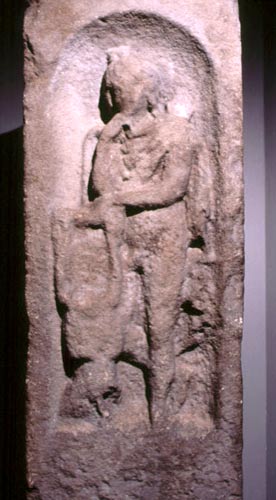
The archetypes there are all very familiar, Bau was the innkeeper or barmaid that was also proclaimed Queen or Mistress of all the world and the harlot of the inn was an aspect of the cult of Nanaya, associate with Bau was Nisaba who recorded the deeds of everyone and read them aloud at the New year celebrations, the sister of Nisaba was Nanse who concerned herself with the social welfare of the people and was married to the tax collector that supported her programme, these then the Goddesses that were closest to the hearts of the common people, the Sumerians loved beer so at the centre of their culture was the inn.
The inn as the magic portal...
With regards to your point about a tutelary Deity, as i mentioned our Brigit was just that, the Celtic Goddess of Victory of the Brigantes tribe of Northern England, the Romans associated her with Minerva and there is a shrine local to her here, indeed the pillars of the nearby pub are Roman columns from the Temple at Ribchester on the river Belisima, so i don't find these notions distant or obscure but rooted in local history, also at Ribchester we have the dedication to Apollo in terms of a Celtic equivalent
‘To the holy god Apollo Maponus, and for the health of our Lord and the unit of the Gordian Sarmartian Horse at Bremetenacum, Aelius Antonius, centurion of the Sixth Legion, the Victrix from Melitanis praepositus of the unit and the region, willingly and deservedly fulfilled his vow .’
Within Ribchester’s museum stands a pedestal, which is believed to have ‘carried four figures in relief . On one side is Apollo, clad in a cloak and Phrygian cap, wearing a quiver and resting on his lyre. The side which possibly carried a relief of Maponus has been defaced. On another side are two female figures, whose identity and roles have been interpreted differently. Nick Ford interprets the relief to depict the genius loci of Ribchester making an offering to Belisama, the goddess of the Ribble.
So yes, in essence, we change our ways little...

edit on Kam430115vAmerica/ChicagoSunday2630 by Kantzveldt because: (no reason given)
edit on
Kam430115vAmerica/ChicagoSunday2630 by Kantzveldt because: (no reason given)
new topics
-
A Merry Christmas.
Other Current Events: 3 hours ago -
Cold Blooded Killers on Christmas!! GRRRRrrr!!
Pets: 10 hours ago
top topics
-
Cold Blooded Killers on Christmas!! GRRRRrrr!!
Pets: 10 hours ago, 9 flags -
Plane Crash Today --Azerbaijanian E190 passenger jet
Mainstream News: 15 hours ago, 6 flags -
A Merry Christmas.
Other Current Events: 3 hours ago, 4 flags
active topics
-
It's Offical Now
US Political Madness • 19 • : Oldcarpy2 -
A Merry Christmas.
Other Current Events • 4 • : AlroyFarms -
Cold Blooded Killers on Christmas!! GRRRRrrr!!
Pets • 11 • : charlest2 -
The Effects of Electric Fields and Plasma on Plant Growth
Science & Technology • 11 • : ChaoticOrder -
Plane Crash Today --Azerbaijanian E190 passenger jet
Mainstream News • 18 • : Springbok -
Mood Music Part VI
Music • 3765 • : BrucellaOrchitis -
‘Something horrible’: Somerset pit reveals bronze age cannibalism
Ancient & Lost Civilizations • 23 • : BrucellaOrchitis -
London Christmas Market BANS Word ‘Christmas’
Social Issues and Civil Unrest • 51 • : Naftalin -
-@TH3WH17ERABB17- -Q- ---TIME TO SHOW THE WORLD--- -Part- --44--
Dissecting Disinformation • 3814 • : brewtiger123 -
The clotting is not going away latest
Medical Issues & Conspiracies • 15 • : NoCorruptionAllowed
